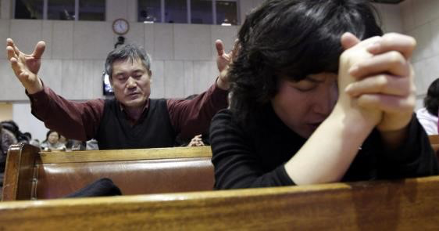
Religion plays a significant role for North Korean refugees and migrants seeking a sense of belonging in their new homelands, a phenomenon that has been largely neglected by scholars, writes Jin-Heon Jung in the online journal Religions (October 9, 2020). Jung writes that after being exposed to Protestant missionary networks while staying in Northeast China or en route to the south, close to 80 percent of these North Korean migrants/refugees affiliate themselves with Protestant churches once they are in South  Korea. He calls this migration from North Korea the “Christian passage,” as migrants are given shelter and protection by evangelical missionaries. In South Korea, they are considered lower status members in the church hierarchy. But the migrants’ evangelical experience empowers them to claim a leadership role in a national evangelization effort. They see this as their calling, even when they migrate to secular Europe (especially Germany). In ethnographic interviews with over 200 North Korean migrant-refugees, Jung finds that unlike other religious migrants, the North Korean were non-believers when they escaped their country and only became Christians while staying in the Sino-North Korean border area. Their conversions not only provided them with a sense of belonging but also an imagined future homeland where they hope to return to North Korea to evangelize its people.
Korea. He calls this migration from North Korea the “Christian passage,” as migrants are given shelter and protection by evangelical missionaries. In South Korea, they are considered lower status members in the church hierarchy. But the migrants’ evangelical experience empowers them to claim a leadership role in a national evangelization effort. They see this as their calling, even when they migrate to secular Europe (especially Germany). In ethnographic interviews with over 200 North Korean migrant-refugees, Jung finds that unlike other religious migrants, the North Korean were non-believers when they escaped their country and only became Christians while staying in the Sino-North Korean border area. Their conversions not only provided them with a sense of belonging but also an imagined future homeland where they hope to return to North Korea to evangelize its people.
(Religions, https://www.mdpi.com/2077-1444/11/10/510)